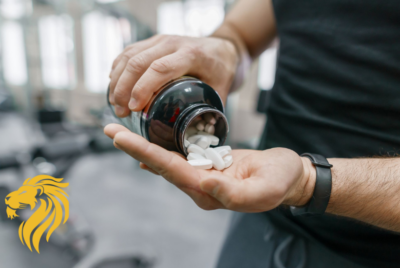6 Lifestyle Hacks to Boost Testosterone Levels
Introduction
As someone who’s deeply invested in maintaining optimal health and vitality, I’ve delved into various ways to naturally enhance testosterone levels. In this article, I’m excited to share with you 6 Lifestyle Hacks to Boost Testosterone levels. Let’s dive in!
Testosterone is a critical hormone essential for men’s health, playing a crucial role in everything from muscle growth and bone density to libido and mood regulation. However, various lifestyle factors can influence testosterone levels, and by making some simple adjustments, it’s possible to optimize your hormonal balance and overall well-being.
Excellent Sleep Boosts Testosterone
Quality sleep is important when it comes to testosterone production. Here are some tips to ensure you’re getting the restorative sleep your body needs:
Get a Consistent Sleep Schedule: Aim for seven to nine hours of sleep each night and try to stick to a regular sleep-wake cycle, even on weekends.
Be Mindful of Artificial Light From Screens: Blue light emitted from electronic devices can disrupt your body’s natural sleep-wake cycle. Limit screen time before bed or use blue light-blocking glasses.
Keep It Cool in the Bedroom: Lowering the temperature in your bedroom can improve sleep quality. Aim for a cool, comfortable environment to promote restful sleep.
Foods that Boost Testosterone
Your diet plays a significant role in testosterone production. Incorporating the following nutrient-rich foods can help support healthy testosterone levels:
Get Zinc, Vitamin D, & Omega-3s: Foods rich in zinc, such as oysters, pumpkin seeds, and lean meats, can support testosterone production. Additionally, vitamin D-rich foods like fatty fish and fortified dairy products, along with omega-3 fatty acids found in fish oil, eggs and flaxseeds, can also contribute to optimal testosterone levels.
Exercises: 6 Lifestyle Hacks to Boost Testosterone Levels
Regular exercise is essential for maintaining overall health and well-being, including testosterone levels. Here are some effective workouts to consider:
Heavy Lifting, HIIT, & Intense Cardio Are Most Effective: Strength training, high-intensity interval training (HIIT), and intense cardiovascular workouts have been shown to boost testosterone levels significantly.
The importance of a Healthy Lifestyle: Incorporating exercise into your daily routine not only supports testosterone production but also promotes cardiovascular health, muscle strength, and overall vitality.
Manage Stress
Chronic stress can wreak havoc on your hormonal balance, including testosterone levels. To reduce stress and promote hormonal equilibrium, try incorporating the following stress management techniques into your daily routine:
Proven Stress Reduction Techniques: Practice mindfulness meditation, deep breathing exercises, yoga, or progressive muscle relaxation to alleviate stress and promote relaxation.
Optimize Your Environment: 6 Lifestyle Hacks to Boost Testosterone Levels
Creating a testosterone-friendly environment involves minimizing exposure to factors that can negatively impact hormonal balance. Consider the following strategies:
Minimize Artificial Light at Night: Exposure to artificial light at night, especially blue light from screens, can disrupt sleep patterns and interfere with testosterone production. Limit screen time before bed and use blackout curtains to block out external light sources.
Reduce EMFs and Toxins: Electromagnetic fields (EMFs) from electronic devices and environmental toxins found in certain household products can interfere with hormonal function. Take steps to reduce exposure by using EMF-blocking devices and choosing natural, non-toxic alternatives whenever possible.
Supplements That Boost Testosterone
In addition to lifestyle modifications, certain supplements can help support healthy testosterone levels:
Magnesium, Zinc, Vitamin D, & Ashwagandha: These supplements have been shown to support testosterone production and overall hormonal balance. Consider incorporating them into your daily regimen, but remember to consult with a healthcare professional before starting any new supplement regimen.
Conclusion:
By implementing these six lifestyle changes—prioritizing quality sleep, consuming testosterone-boosting foods, engaging in testosterone-enhancing exercises, managing stress effectively, optimizing your environment, and considering targeted supplementation—you can naturally support healthy testosterone levels and reap the numerous benefits associated with balanced hormones.
FAQs (Frequently Asked Questions) 6 Lifestyle Hacks to Boost Testosterone Levels
Can I boost testosterone levels naturally?
Yes, making lifestyle changes such as prioritizing sleep, exercising regularly, managing stress, and eating a balanced diet rich in testosterone-boosting nutrients can help support healthy testosterone levels naturally.
Are there any side effects associated with boosting testosterone naturally?
Generally, making lifestyle changes to support healthy testosterone levels is safe and unlikely to cause adverse side effects. However, it’s essential to consult with a healthcare professional before making any significant changes to your lifestyle or starting a new supplement regimen.
How long does it take to see results from these lifestyle changes?
The timeline for seeing results may vary from person to person. While some individuals may notice improvements in energy levels, mood, and libido relatively quickly, it may take several weeks or even months to see significant changes in testosterone levels.
Can stress negatively impact testosterone levels?
Yes, chronic stress can disrupt hormonal balance, including testosterone production. Implementing stress management techniques such as mindfulness meditation, deep breathing exercises, and yoga can help mitigate the negative effects of stress on testosterone levels.
Are there any specific exercises that are particularly effective for boosting testosterone?
Yes, exercises such as heavy lifting, high-intensity interval training (HIIT), and intense cardiovascular workouts have been shown to significantly increase testosterone levels. Incorporating these types of exercises into your fitness routine can help support healthy testosterone production.
https://www.health.harvard.edu/staying-healthy/testosterone–what-it-does-and-doesnt-do
This article from Harvard Health Publishing discusses the role of testosterone in men’s health, its effects on the body, and potential benefits and risks associated with testosterone therapy.




